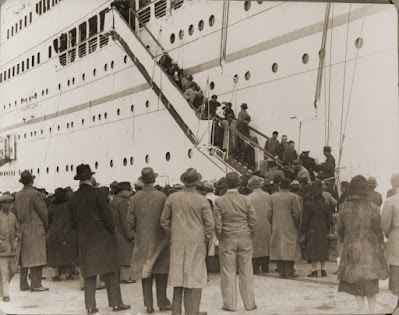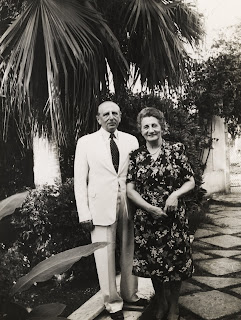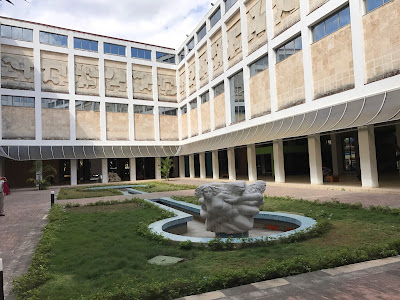Previously in this WAM Update series, Dr. Richard Neumann and his wife, with the help of their guide "Mr. P." successfully smuggled themselves out of Nazi-occupied Paris and crossed the border into unoccupied Vichy France. However, they were soon arrested, and found to have entered the territory without official leave. They must await their trial to learn whether they will be handed over to the German authorities or allowed to continue into Spain.
Dr. Neumann and his art collection are the subject of WAM's ongoing exhibition, "What the Nazis Stole from Richard Neumann (and the Search to Get it Back)," on view through January 2022. This narrative was written by Dr. Neumann, and shared with the permission of his family.
--
[With the help of Mr. P., the Neumanns were allowed to await their trial in the town of M., where a guest house was available. They had to regularly report to the police station in M., where their documents were held.]
 |
| The Neumanns' journey from Vienna, Austria to Havana, Cuba |
Unfortunately Mr. P. also imparted the news that we had been robbed, and that the 22,000 French francs were missing from the briefcase. Luckily, the $200 was still there. We were appropriately horrified, but already so tired and worn out that we were glad to know that at least the dollar amount had been saved…
Now began for us a somewhat boring, but for our nerves a much needed rest and rehabilitation…
[The Neumanns requested permission to leave France, in light of their danger. The police ultimately declared they had to stay until after their trial was settled, and that at best they should expect a fine—at worst, being turned over to German authorities.]
We awaited the 26th of September with great concern, at which time the court proceedings were to take place in the State capital. The trip […] would require a journey of two days. Fortunately, we had a visit from the policeman from the town where we were originally arrested, who had shown himself to be somewhat sympathetic to our situation. We explained our concerns to him, and told him that the local policeman insisted that we return once more after the judicial process, and that he would—depending on the ruling of the Court—then decide whether or not to issue the travel permit. Since we had meanwhile already missed connections with one ship, any further delay, even by a day, was extremely uncomfortable for us. Thus we were extremely happy when our friend declared himself ready to issue us a safe-conduct for travel, so that, in the event of our being freed by the court, we could immediately depart.
On the 24th we got under way to the Courthouse and took with us, just in case, the few belongings left to us. On the 26th, at noon in a beautiful old courthouse, the formal proceedings took place…
The very friendly and sympathetic judge posed just a single question, the answer to which was already on the tip of my tongue: “…did you feel endangered in Paris?...” Since I was able to reply in the affirmative, based on the German racial regulations, he declared—after a brief advisory discussion with his colleagues, and to our indescribable joy, since we had expected at least a fine—that we could go free on the grounds of unavoidable danger. Our safe-conduct permit was good until October 10th. On September 27th we finally arrived in B. where we recovered our luggage except for two pieces, which could not be immediately found, cleared our accounts with Mr. P. and after a short stay traveled onward to Toulouse.
[Once in Toulouse, Neumann sought permission to take the remaining $200 out of the country. On October 8th, he got the required proof from the National Bank of France, stating that he had received it at the official exchange rate.]
 |
| The Italian ship "Conte Verde" brings Jewish refugees to Shanghai, 1938 (United States Holocaust Memorial Museum, courtesy of National Archives and Records Administration, College Park) |
…Since we now only had two days remaining on our safe-conduct, we could no longer await the promised delivery of our two missing pieces of luggage, so we asked our friends to send them along later, and left on October 9th for Barcelona. Passage through the customs control was relatively easy, but upon arrival in Barcelona we were advised that all the passenger ships were completely sold out until the following January. Through a coincidence we found a friend who had close connections with the founder of a shipping line, who took us to him, and there we were promised that, if the full fare to Havana were promptly remitted, we would receive the first available tickets. We telegraphed immediately to effect payment for the ship tickets, and traveled on to Bilbao. There we were told again that there were absolutely no tickets to be had.
In the meantime, a regulation was promulgated that the Transatlantic Shipping Company would no longer be permitted to transport non-Aryan persons. Our visa read “Visa without arrest,” [i.e. the Neumanns could pass through Spain but not take up residence] and we were threatened with the possibility that, if we did not make it on the next boat, we would be deported. The big question was: where to? France would naturally not allow us to enter, and again the German concentration camps threatened in the background.
At that point we asked ourselves whether the big adventure, the huge monetary sacrifice and all that effort would, at the last moment, all have been in vain. We now went daily to the shipping line offices and after two days we heard that those persons, whose tickets had already been paid for, could still be taken on board, and the definite prohibition (against non-Aryans) would only take effect on the following voyage. We were told, however, that our payment had not been made, nor were the tickets on hand.
 |
| Richard and Alice Neumann in the garden of their house in Havana |
The nerve-wracking situation continued until three days before the sailing date of the ship, when we were suddenly notified by telephone that the tickets had already been paid for in Havana on September 28th (the last day for acceptance of payment). We received two tourist class tickets, and finally left old Europe on November 10th, putting a temporary end to our Odyssey in Cuba.
--
Upon reaching Havana, Dr. Neumann and his wife were safe; once again, he found work in the textile industry and became a leading figure in the local art community, giving lectures on European and Cuban art to a wide audience. He was named honorary President of the “Patronato del Arte,” a group founded to create a modern art museum in Havana. This museum, the Museo Nacional de Bellas Artes de La Habana (National Museum of Fine Arts of Havana, pictured below), was recognized by UNESCO, and is still a major cultural attraction today.
After the war, Dr. Neumann and Alice traveled to New York City, reuniting with their daughters.
 |
| The Museo Nacional de Bellas Artes de La Habana (National Museum of Fine Arts of Havana) |
 |
| Richard and Alice Neumann with their daughters Dora and Lili, New York, early 1950s |
